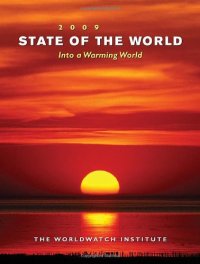
Ebook: State of the World 2009: Into a Warming World (State of the World)
Author: The Worldwatch Institute
- Series: State of the World
- Year: 2009
- Publisher: W. W. Norton & Company
- Edition: 1
- Language: English
- pdf
This was written at the end of 2008/beginning of 2009, when many had hopes that some accord could be reached at Copenhagen. As many know, that was not to be the case. Although this doesn't make such a gloomy prediction, it does lay out the competing principles and reasons why well-developed countries such as the U.S. and EU and rapidly developing countries such as China, India and Brazil would ultimately be at loggerheads at the conference. (They also make mention of the significant role the U.S. Senate played in stalling progress on climate treaties unless the developing countries were held to the fire as well.)
The book gives a detailed overview of where we are with the climate and the effects that extreme weather and overall warming is having on human and non-human systems. It also lays out the urgency to keep temperature rise well below the 2 degrees that has been thrown around- the planet is still habitable at that point, but the losses of other species and human habitats may be insurmountable. My favorite chapters were on agricultural options to better sequested carbon- no more double-digging for me!- and the potential for the usage of renewable technology that is currently out there, although I'm not sure I believe the carbon capture system at the factory level actually exists. The chapter on resilience was not written as well as the others, but I agreed with the overall point: resilience needs to mean more than our ability to bounce back to the status quo; vulnerable populations need to be able to enact positive socioeconomic changes in the midst of the ongoing climate disaster if they want to not only thrive but just survive.
The most frustrating part of the book, not surprisingly, was the one that included a history of the diplomatic and political efforts to fund and define the changes that need to be made and by whom. It's easy to understand why the talks effectively went nowhere (although not excusable). However, the author of that section also points out that while temperatures have continued to rise since diplomacy on the issue first began in the late 80s, they would have risen even more if it hadn't been for those efforts.
One quasi-positive note: at least the science is no longer in question.
We've got some work to do.
The book gives a detailed overview of where we are with the climate and the effects that extreme weather and overall warming is having on human and non-human systems. It also lays out the urgency to keep temperature rise well below the 2 degrees that has been thrown around- the planet is still habitable at that point, but the losses of other species and human habitats may be insurmountable. My favorite chapters were on agricultural options to better sequested carbon- no more double-digging for me!- and the potential for the usage of renewable technology that is currently out there, although I'm not sure I believe the carbon capture system at the factory level actually exists. The chapter on resilience was not written as well as the others, but I agreed with the overall point: resilience needs to mean more than our ability to bounce back to the status quo; vulnerable populations need to be able to enact positive socioeconomic changes in the midst of the ongoing climate disaster if they want to not only thrive but just survive.
The most frustrating part of the book, not surprisingly, was the one that included a history of the diplomatic and political efforts to fund and define the changes that need to be made and by whom. It's easy to understand why the talks effectively went nowhere (although not excusable). However, the author of that section also points out that while temperatures have continued to rise since diplomacy on the issue first began in the late 80s, they would have risen even more if it hadn't been for those efforts.
One quasi-positive note: at least the science is no longer in question.
We've got some work to do.
Download the book State of the World 2009: Into a Warming World (State of the World) for free or read online
Continue reading on any device:

Last viewed books
Related books
{related-news}
Comments (0)